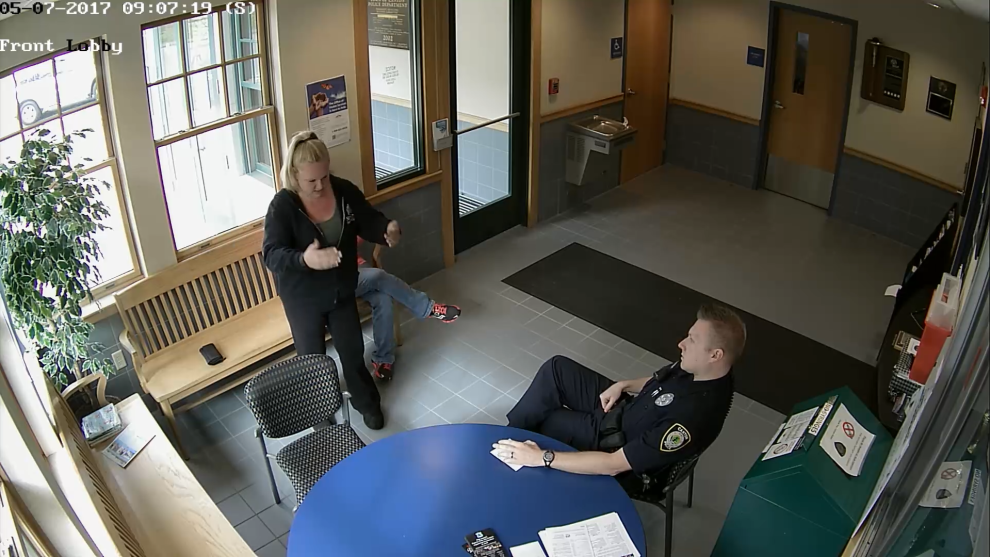
President Donald J. Trump participates in a signing ceremony for First Step Act in the Oval Office of the White House. Martin H. Simon/ZUMA
Last November, as he rallied support for federal prison reform, President Donald Trump visited Gulfport, Mississippi, touting the legislation and what Mississippi had accomplished.
Trump talked about the “fantastic job” that Mississippi Corrections Commissioner Pelicia Hall was doing of turning the state’s prisons into places that train inmates for jobs.
The following month, Trump signed the First Step Act, whose goal is to reduce the federal prison population and better prepare offenders for life outside bars.
Yet the implementation of Mississippi’s reforms has been marked by broken promises and a lack of funding, according to interviews, data and documents reviewed by the Mississippi Center for Investigative Reporting and ProPublica.
The Mississippi law promised to send offenders to drug courts for treatment rather than to prison; provide ID cards to all offenders leaving prison to help them secure housing and jobs; offer training for offenders eligible for parole; and keep offenders guilty of technical probation violations from returning to prison.
But in each case, those efforts have faltered.
When Gov. Phil Bryant, a Republican, signed House Bill 585 into law in 2014, the measure drew widespread praise from conservatives and liberals alike because it promised to reduce the prison population, save millions and reinvest some of the money into programs for offenders.
Instead, all of those savings have gone back into the state’s coffers, helping to pay for huge corporate tax cuts at a time the state was struggling to meet revenue estimates.
Over five years, the Mississippi Department of Corrections spent $185 million less in total than it would have had its budget remained at the level it was in 2014. The department’s $347 million budget for the coming fiscal year is $30 million less than it was in 2014.
Meanwhile, the number of prisoners is creeping back up, and the lack of funding and staff is contributing to worsening conditions. Over the rest of this year, the Mississippi Center for Investigative Reporting and ProPublica will explore those conditions.
In an interview, Senior U.S. District Judge Keith Starrett, of Hattiesburg, called House Bill 585 “a good law, but up until now, it’s never been fully implemented. Had it been fully implemented, it would have reduced recidivism. How much, we’ll unfortunately never know.”
Before the Mississippi Legislature met in 2019, Hall told lawmakers that the reforms of House Bill 585 were “for naught if we don’t reinvest the savings.”
With the Corrections Department understaffed, “we cannot offer the programs we want to,” such as educational programs, alcohol and drug treatment and the like, she said.
Experts say Mississippi provides a cautionary tale for the nation as it implements the First Step Act.
Emptying prisons of offenders “without treating their addiction, without mental health treatment and without job training is really irresponsible,” said Pat Nolan, director of the American Conservative Union Foundation’s Center for Criminal Justice Reform, which campaigned for the passage of the state and federal legislation.
“It’s unconscionable.”
Between 1993 and 2013, Mississippi’s prison population more than quadrupled, thanks largely to mandatory minimum sentences, with the population peaking in the past decade at more than 23,000. The state had a higher per capita rate of incarceration than countries such as China or Russia.
In 2013, lawmakers created a bipartisan Corrections and Criminal Justice Oversight Task Force to look into possible solutions, which led to House Bill 585.
By the time the bill became law in July 2014, the Mississippi Parole Board was paroling more offenders and had already reduced the prison population by about 2,000 inmates. Within six months, it fell even more, to below 19,000.
The Pew Charitable Trusts, which provided assistance to officials on the reform, predicted that by 2024 Mississippi would save $266 million by reducing its prison population.
Supporters of the First Step Act point to such numbers as evidence of the federal law’s potential. “We’ve based it on a lot of what’s been done in a lot of the states like Mississippi,” said White House adviser Jared Kushner, who is Trump’s son-in-law, at the Gulfport event.
Other numbers, however, tell a different story.
The prison population has begun to tick back up, from 18,964 in January 2018 to 19,697 last week, largely due to probation and parole revocations putting offenders back behind bars. If current trends continue, Mississippi will have more inmates in 2020 than it did before the reform became law.
“The good news is it’s not as high as it was in 2014,” Parole Board Chairman Steve Pickett said. “But to quote President Reagan, ‘Are we better off than we were four years ago?’ Do we have more parole and probation officers? Do we have more prison guards?”
The answer, data shows, is no.
In 2014, the Corrections Department had 1,591 correctional officers, according to the state Personnel Board. Now there are 772, fewer than half as many.
In 2014, the department had 23 vocational education instructors. Now there are 15.
In 2014, there were three vocational counselors. Now there are two.
In 2014, there were 319 probation officers, according to the state Personnel Board. Now there are 257.
Moreover, the investments in prisoner rehabilitation and training haven’t happened either.
Hal Kittrell, of Columbia, who chaired the task force and is a past president of the Mississippi Prosecutors Association, said House Bill 585 “was designed to have a savings in cost, but it also anticipated reinvestment back into the program.”
Texas saw $443 million in savings from prison reform between 2008 and 2009 and reinvested more than half of that into expanding drug treatment and similar programs for offenders, according to the Council of State Governments.
Five years after Mississippi passed House Bill 585, “we’ve not spent one dime more on reentry, drug treatment and mental health counseling,” Kittrell said. “Where did the money go?”
House Corrections Committee Chairman Bill Kinkade, R-Byhalia, said Mississippi’s economy is now growing, and that should enable lawmakers to spend more on reentry programs. He said the legislative leadership supports this move as well.
But the state has favored other priorities in recent years.
In 2015, lawmakers approved spending $9 million on vouchers for special education students to attend private schools. A year later, the Legislature began phasing out the corporate franchise tax, which was bringing in $260 million a year. At the same time, it cut $145 million in income taxes.
Hall, the corrections commissioner, said she has asked the Legislature for more funding. She called the decreased number of personnel “alarming,” especially for correctional officers, saying they “can’t afford to live” on the entry-level salary of $24,900.
The promise of insurance and a state retirement isn’t enough for those seeking to support a family, and neighboring states are offering much more, she said. Alabama, which already pays thousands more than Mississippi, is considering raising its starting pay even more.
One bright spot, Pickett said, is that the Corrections Department has increased its funding for transitional beds, which are similar to halfway houses. The number of beds had remained mostly unchanged until this past year when they went from 120 to 314.
“Am I satisfied with the progress?” Kinkade asked. “No, but we’re making strides and progress. Yes, there are tweaks that still need to take place.”
Among its primary aims, House Bill 585 promised to redirect more offenders whose behavior was driven by drug and alcohol dependence away from prison and to drug courts, which connect them with job and life-skills training as well as drug, alcohol and mental health treatment.
A memo written by the nonprofit Pew talked of a reinvestment of nearly $11 million in savings into drug courts.
Instead, Mississippi lawmakers cut the annual budget for drug courts in half from nearly $8 million in 2013. It has since inched up somewhat, to $6.5 million this year.
Inside Mississippi’s prisons, three-fourths of the more than 19,000 inmates suffer from alcohol or drug woes. Mental health problems also play a role.
Despite that, the Corrections Department has only 20 drug and alcohol counselors and one licensed psychologist, according to the state Personnel Board. Arkansas, which has a similar prison population, has eight psychologists and 33 administrators of its substance abuse programs.
“Addiction is the prison driver,” Pickett said.
Steps so far to provide community mental health have been small. Over the past three years, the Corrections Department has received $1.4 million in federal grants for drug treatment and mental health treatment of offenders who returned to seven counties.
Good news came this spring when lawmakers passed, and the governor signed into law, a bill transforming the drug courts into intervention courts, which can also tackle mental health matters and issues affecting military veterans.
In interviews, offenders gave mixed reviews of the 12-step recovery program. One woman recently released from the Central Mississippi Correctional Facility praised it. A second, who had a different instructor, called the program “a joke,” saying they spent their time watching Hollywood movies rather than working on recovery.
Hall said the recovery program has been changed and is now evidence-based. One problem that corrections officials face is Mississippi inmates can’t be forced to enter drug treatment programs, as those in federal prisons are. “I can’t make them participate,” she said.
She acknowledged that the shortage of counselors is hurting the system.
State Public Defender André de Gruy said evidence shows drug courts can reduce recidivism if operated properly. “That means clinical assessments on the front end, heightened supervision, and available treatment options, especially for relapse,” he said. “I think the last part is most important and most lacking in Mississippi.”
Mississippi also lacks the programming to help offenders transition from prison to their communities, according to the task force that spearheaded the legislation.
These reentry programs, as they are known, play a key role in offenders’ success on the outside, Kinkade said.
Right now in Mississippi, nearly every inmate “comes home at some point, unsupervised and unmanaged,” said the House Corrections Committee chairman.
To help correct that, Hall said her department is focusing more on educational programming, drug treatment, and vocational programs.
But she acknowledged it has been forced to slash the number of correctional officers in the wake of legislative cuts, making it difficult to carry out some of these reentry programs.
Kinkade said he would like to see the state’s new intervention courts operate like federal reentry courts, providing a support mechanism for offenders seeking jobs, getting alcohol and drug treatment, and getting counseling and other mental health treatment.
In Hattiesburg, Starrett, the federal judge, operates a federal reentry court, and he recently presided over the graduation of three onetime criminals from a yearlong program to help transform their lives. (The federal reentry court does not have jurisdiction for those convicted in state court.)
Of the 35 offenders who have participated in the program since 2012, only five were rearrested, according to the court’s figures.
Transforming these career criminals into hard-working citizens also saves taxpayers millions of dollars, he said.
Other states are following a similar path. Offenders entering Louisiana prisons are interviewed and given tests to assess their needs. Corrections officials then create plans to reduce the offenders’ risk of returning to prison and enter them in programs, including job training and money management.
The Mississippi Corrections Department had a risk-assessment test before, but it lacked proof that it worked, Hall said. The department “had spent an exorbitant amount of money on it. I think somebody sold them a bill of goods.”
A new tool is being used on every offender who enters prison, she said.
It will be used again as they leave, she said.
House Bill 585 requires Mississippi’s Corrections Department to ensure each of the more than 8,000 offenders leaving prison annually has a driver’s license or state ID card, but lawmakers provided no extra funding for these cards. Fewer than 100 offenders are receiving them a month, according to the department.
“You can’t get a job without an ID,” said Starrett, the federal judge. “If you somehow get a job, you can’t cash a check without an ID. You can’t even get some prescriptions from the drugstore without an ID.”
The problem is many offenders lack birth certificates or Social Security cards, and the Department of Public Safety requires both for an ID card, Hall said. It can take months or even longer for replacements to arrive, she said.
By contrast, Louisiana corrections officials try to get at least two forms of identification for offenders, as well as replacement birth certificates and Social Security cards if needed.
Since taking over the Corrections Department in 2017, Hall said she has made providing IDs a priority. The Mississippi Department of Public Safety now comes to the prisons as often as once a week, she said.
Louisiana also enables judges to preside over a reentry program, where nonviolent offenders who face up to 10 years in prison may qualify to join a job-training program that can cut their time behind bars down to two years.
Those who finish the program have a recidivism rate of 9.4%, compared with more than 30% for the average inmate in Louisiana.
Louisiana inmates can earn more than 60 industry-based certifications, enabling them to line up jobs before they leave prison. Mississippi has fewer than 10 of these programs.
One of the most valuable ones that Mississippi now offers is trucking, where offenders can often get jobs, Hall said. Louisiana is now copying this program.
Ingalls Shipbuilding is also aiding the department in training offenders and providing jobs, she said. “They leave, making more money than my correctional officers,” up to $25 an hour.
Mississippi offenders taking part in educational or vocational programs have a lower recidivism rate than the state as a whole, 16% to 19% compared with 33%, Hall said.
Once outside prison, support is even harder to come by because Mississippi operates no halfway houses, and probation officers say they are overwhelmed.
One former Mississippi probation officer said her caseload earlier this year included as many as 340 offenders. She assisted many in getting into rehab, some into jobs and some in getting their driver’s licenses back.
“We were desperately understaffed,” said the officer, who asked not to be named for fear it could hurt her new job in another state. “It was very stressful.”
The Corrections Department has far fewer probation-parole officers than recommended by staffing formulas developed by the American Probation and Parole Association. In November 2016, the agency said it would need 233 additional officers to be at recommended levels.
More recent data was not available, but Hall acknowledges a lack of staffing. To handle such woes, probation officers now focus on high-risk offenders. But with caseloads of 200 to 300 people, the task is difficult, if not impossible, she said.
Kittrell, a district attorney for five counties in south central Mississippi, said unless the state starts investing in reentry programs, offenders are destined to return to prison.
“Here we are, releasing them into the same neighborhood, with no skill sets at all, and expecting a different outcome,” he said. “That’s the definition of insanity.”
Another priority of the law was to reduce recidivism. But the very nonprofit that the Legislature created to reduce recidivism, Mississippi Prison Industries, can’t prove it is fulfilling its mission, according to the state’s legislative watchdog.
The Performance Evaluation and Expenditure Review Committee determined that the nonprofit failed to maintain accurate data about the program, discovering missing invoices and receipts to substantiate travel and other expenses. In just two years, the nonprofit lost $3.2 million more than it raised.
Rep. Jerry Turner, R-Baldwyn, who chairs the Mississippi House Committee on Accountability, Efficiency, and Transparency, said: “People are trying to figure out how to make Mississippi Prison Industries viable and effective. We don’t have the answer.”
Mississippi Prison Industries officials did not return repeated calls, but they have defended their operation as sound to lawmakers and journalists.
Hoping to reduce probation revocations, House Bill 585 requires judges to send offenders guilty of two or fewer technical violations to a Technical Violations Center.
Many judges balked.
“They feel like some discretion has been taken away from them,” Circuit Judge Prentiss Harrell, of Hattiesburg, said in an interview.
Circuit Judge Dal Williamson, of Laurel, blasted House Bill 585 from the bench, saying that it “strips from the law the court’s authority to impose serious consequences.”
Another judge ruled House Bill 585 unconstitutional, saying it violated the separation of powers, a decision the Mississippi Supreme Court later overturned.
The push to reduce the actual time offenders spend behind bars has rankled some judges and prosecutors.
District Attorney Ronnie Harper, of Natchez, said prosecutors want to be able to tell victims what to expect from an offender’s sentence.
If he has promised the victim that the offender will serve 25% of his or her time, and the offender is released earlier, running into the victim at the grocery store, that’s a problem, Harper said.
“They lose confidence in the system, and they lose confidence in you.”
Despite its flaws, House Bill 585 has meant a new beginning for some.
Jody Owens II, the Southern Poverty Law Center’s managing attorney for Mississippi, said the law has paved the way for trial judges to help give new lives to nonviolent offenders. The Parole Board is releasing about two offenders per month under this provision, the board says.
Inmate Jerry Johnson hopes to join them. In 1993, he received 60 years without parole in Coahoma County Circuit Court for making two $20 crack cocaine sales under Mississippi’s “three strikes” rule. In March, a judge there authorized Johnson’s eligibility for parole.
If the Parole Board agrees, the 60-year-old Johnson would walk free after 26 years in prison. Owens said Johnson wants to help his ill sister and assist youth in the community.
This would “save Mississippi approximately $620,000,” the expected cost of imprisoning him for the rest of his term, Owens said. “This is so significant. It is giving people freedom.”
ProPublica is a Pulitzer Prize-winning investigative newsroom. Sign up for The Big Story newsletter to receive stories like this one in your inbox.














